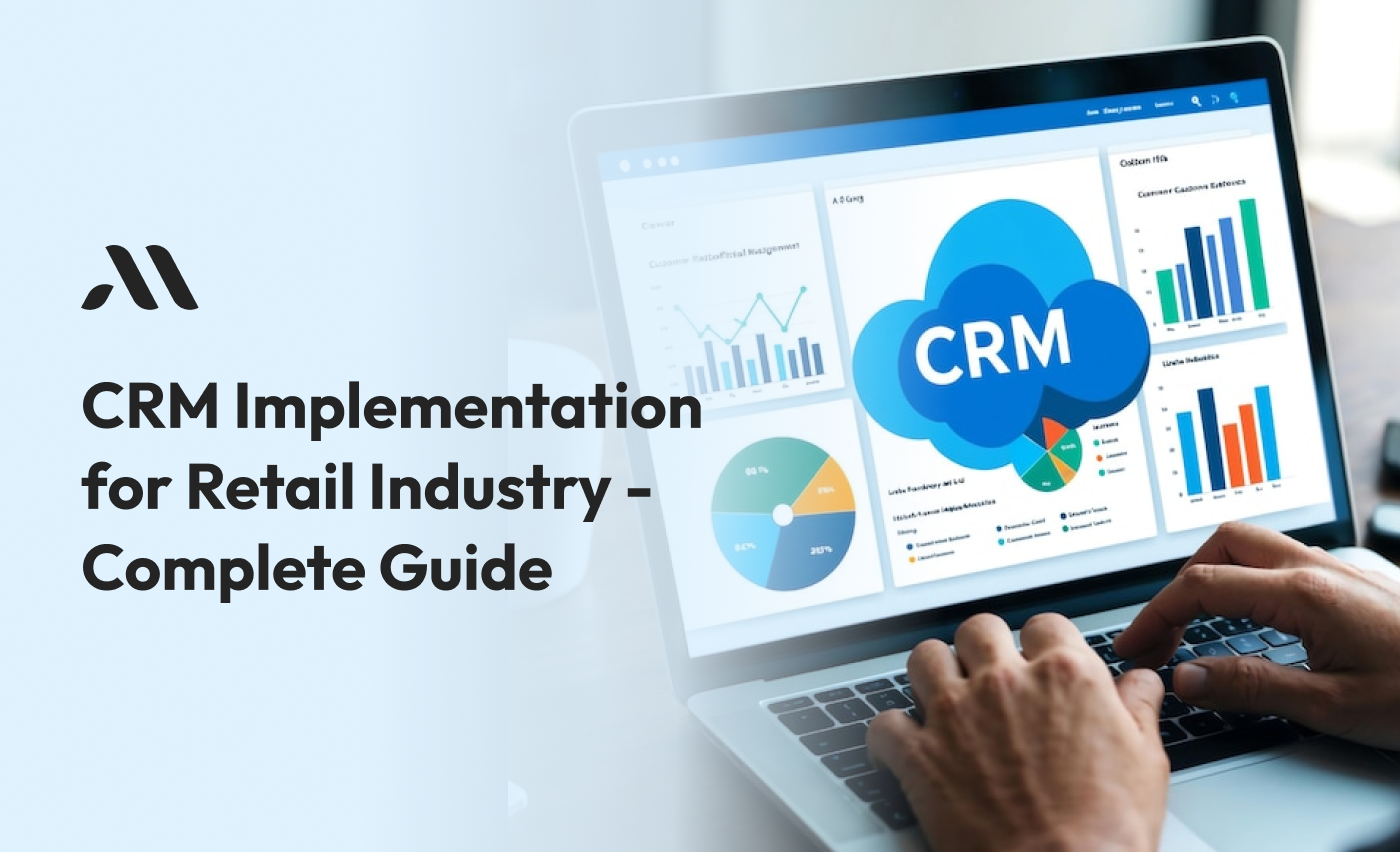Introduction
In today’s competitive retail world, keeping customers happy is key to success. A CRM (Customer Relationship Management) system helps businesses manage customer relationships effectively. CRM implementation can make your retail business run smoothly, improve customer satisfaction, and increase sales. This guide will walk you through everything you need to know about CRM implementation for your retail business.
What is CRM Implementation?
CRM implementation is the process of setting up a CRM system in your business. It involves choosing the right CRM software, planning how it will be used, and then actually putting it into practice. The goal is to make sure that the CRM system helps your business track customer interactions, manage sales, and improve customer service.
Remember: A well-planned CRM implementation can turn your retail business into a customer-focused powerhouse.
A study by Nucleus Research found that for every dollar spent on CRM, businesses can expect an average return of $8.71. This shows just how valuable CRM implementation can be for your retail business.
Why is CRM Implementation Important for Retail?
CRM implementation is crucial for the retail industry because it helps businesses understand their customers better. By using a CRM system, retail business owners can:
- Track customer behaviour: Know what your customers are buying and when.
- Improve customer service: Respond quickly to customer needs and complaints.
- Increase sales: Provide personalized deals and recommendations.
- Simplify operations: Automate tasks like sending emails or tracking orders.
Tip: Start with a clear goal for your CRM implementation. Do you want to improve customer service or increase sales? Knowing your goal will help you choose the right CRM system.
CRM Implementation Steps for Retail Businesses
Implementing a CRM system involves many key steps. Here’s a step-by-step guide to help you get started:
Define Your Goals: Before you start, figure out what you want to achieve with CRM implementation. Are you looking to improve customer service, increase sales, or both?
Choose the Right CRM System: Not all CRM systems are the same. Some are designed specifically for retail businesses, while others are more general. Look for a CRM system that offers features like customer segmentation, sales tracking, and inventory management.
Note: If you have unique business needs, consider custom CRM development. A custom CRM development company can build a CRM system customized to your specific requirements.
Plan Your CRM Implementation: Once you’ve chosen a CRM system, plan how it will be implemented. This includes setting up the software, training your staff, and deciding how you’ll measure success.
“Failing to plan is planning to fail.” - Benjamin Franklin. A well-thought-out plan is crucial for successful CRM implementation.
Train Your Team: Your CRM system is only as good as the people using it. Make sure your staff is well-trained in how to use the CRM system effectively.
Import Your Data: Gather all your customer data and import it into the CRM system. This includes contact information, purchase history, and any other relevant details.
Remember: Clean your data before importing it. Remove duplicates and ensure all information is up to date.
Test the System: Before going live, test the CRM system to make sure everything is working correctly. Check for any bugs or issues that need to be fixed.
Launch and Monitor: Once you’re confident everything is set up, launch the CRM system. Keep an eye on how it’s working and make adjustments as needed.
Measure Success: After a few months, measure the success of your CRM implementation. Are you meeting your goals? Use the data from the CRM system to evaluate its effectiveness.
According to a study by Salesforce, businesses that use a CRM system see an average increase of 29% in sales and a 34% improvement in customer satisfaction.
Benefits of CRM Implementation for Retail
Implementing a CRM system in your retail business offers numerous benefits:
Improved Customer Relationships: CRM systems help you understand your customers better, allowing you to provide personalized service and build stronger relationships.
Increased Sales: By tracking customer behavior and preferences, you can provide targeted promotions and increase sales.
Better Decision Making: With all your customer data in one place, you can make informed decisions about your marketing strategies, inventory management, and more.
Simplify Operations: CRM systems automate many tasks, saving you time and reducing errors.
Tip: Choose a CRM system that integrates with other tools you use, like your point-of-sale (POS) system or email marketing platform. This will make your operations even more efficient.
Common Challenges in CRM Implementation
While CRM implementation offers many benefits, it’s not without its challenges. Here are some common issues retail businesses face during CRM implementation and how to overcome them:
Resistance to Change: Your staff may be resistant to using a new system. Overcome this by involving them in the planning process and providing adequate training.
Data Migration Issues: Moving your existing data into the new CRM system can be tricky. Make sure your data is clean and organized before importing it.
Choosing the Wrong CRM System: Not all CRM systems are suitable for retail businesses. Do your research and choose a CRM system that meets your specific needs.
Note: If you encounter difficulties, consider working with a custom CRM development company. They can help you create a CRM system that’s customized to your business.
Custom CRM Development for Retail Businesses
Sometimes, off-the-shelf CRM systems don’t meet all your needs. In such cases, working with a Custom CRM Development Company can be a good option. A custom CRM system can be designed to:
Match Your Business Processes: Tailor the CRM system to fit how your business operates, rather than changing your processes to fit the software.
Provide Unique Features: Add features that are specific to your retail business, like special inventory management tools or customer loyalty programs.
Integrate with Other Systems: Ensure smooth integration with your existing tools, such as your POS system or e-commerce platform.
“One size doesn’t fit all.” A custom CRM system ensures you get exactly what your business needs.
Also Read - CRM for Startups | A Guide for Entrepreneurs
Final Thoughts on CRM Implementation for Retail
CRM implementation can transform your retail business by improving customer relationships, increasing sales, and streamlining operations. By following the right CRM implementation steps and choosing the right CRM system, you can achieve your business goals and stay ahead of the competition.
Remember: Successful CRM implementation requires careful planning, the right tools, and ongoing monitoring. Don’t rush the process take the time to do it right, and you’ll see the benefits in no time.
Conclusion
CRM implementation is a powerful tool for retail business owners. By understanding the steps involved, planning carefully, and choosing the right CRM system, you can improve customer satisfaction, increase sales, and make your business run more efficiently. Whether you choose an off-the-shelf solution or work with a custom CRM development company, the key is to focus on your business goals and make sure your CRM system supports them.
Looking to boost your retail business with a custom CRM solution? MicraSol is here to help! We specialize in creating CRM systems customized to your needs. Let’s work together to improve your customer relationships and grow your sales. Contact MicraSol today and take your business to the next level!
Tip: Start small and scale up. Implementing a CRM system doesn’t have to be done all at once. Begin with the basics and add more features as your business grows.
FAQS
What is CRM Implementation?
CRM implementation is the process of setting up a system that helps you manage your customers. It involves choosing the right software, planning how to use it, and making sure it works well for your business. This system helps you track customer information, manage sales, and improve customer service.
Why is CRM Implementation Important for My Retail Business?
CRM implementation is important because it helps you understand your customers better. With a CRM system, you can see what your customers like, how often they shop, and what they need. This information helps you offer better service, increase sales, and keep customers coming back.
How Do I Choose the Right CRM System for My Retail Business?
Choose a CRM system that fits your business needs. Look for features like customer tracking, sales management, and inventory control. If you have unique needs, you might consider a custom CRM system designed just for your business.
What If My Employees Don’t Want to Use the New CRM System?
It's common for people to resist change. You can help by involving your employees in the planning process and giving them proper training. Show them how the CRM system will make their jobs easier and help the business grow.
What Are the Benefits of CRM Implementation?
The benefits of CRM implementation include better customer relationships, increased sales, improved decision-making, and more efficient business operations. With all your customer data in one place, you can make smarter choices and offer personalized service.








